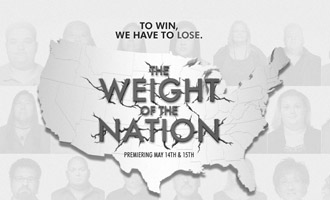
While it’s still hotly debated whether obesity is, in fact, a health crisis, in today’s New York Times, one-time food critic Frank Bruni considers recent obesity research in evolutionary science, medicine, public health, and beyond, concluding that it will require society-level change if we are to stem “a near inevitable tide.” (See also his blog post from today, “The Girth of the Globe,” which discusses Bruni’s perceptions of American dietary habits in a larger context.) The Centers for Disease Control, Bruni writes, now considers about two-thirds of Americans overweight or obese, but “Our current circumstances and our current circumferences may in fact be a toxically perfect fit.”
This is to say, learning to perfect agriculture in abundance has created “plump savings accounts of excess energy” in both our grain silos and our love handles “for an imagined future shortage that, in America today, doesn’t come.” Bruni interviews John Hoffman, an executive producer on HBO’s forthcoming documentary series “The Weight of the Nation,” who tells him that “We’ve only known a world of plenty for maybe 100 years. Our biological systems haven’t adapted to it.” And quoting from Michael L. Power and Jay Schulkin’s book The Evolution of Obesity, Bruni adds, “We evolved on the savannahs of Africa. We now live in Candyland.”
Bruni goes on in his op-ed to consider how one problem in fighting obesity is that we must eat:
“When it comes to smoking or drinking, people generally have to go cold turkey,” notes David Altshuler, an endocrinologist and geneticist, in the documentary. “But fundamentally, we have to eat.” Every meal is a… feat of calibration. “We underestimate how hard it is to change your behavior not once—not for a week or a month until you’re cured—but to change it every day for the rest of your life,” says Altshuler.
In conclusion, Bruni writes we must understand this paradox, cease to vilify the obese, and “rethink and remake our environment much more thoroughly than we seem poised to do.” This may, perhaps, be true well beyond Americans’ own equators.

Comments